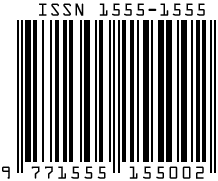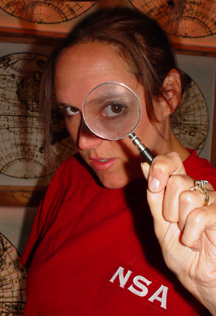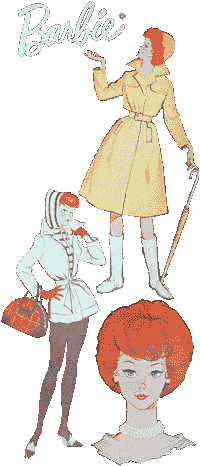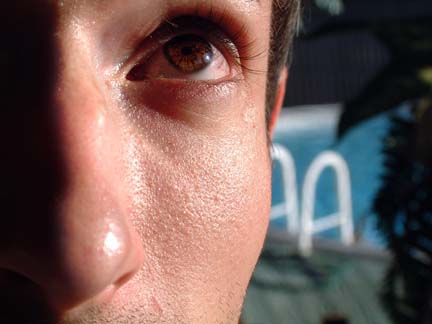|
Dusty Dog Reviews The whole project is hip, anti-academic , the poetry of reluctant grown-ups, picking noses in church. An enjoyable romp! Though also serious. |

|
Nick DiSpoldo, Small Press Review (on Children, Churches and Daddies, April 1997)
Children, Churches and Daddies is eclectic, alive and is as contemporary as tomorrow’s news. |
Children, Churches and Daddies
Volume 157, February 22, 2006
The Unreligious, Non-Family-Oriented Literary and Art Magazine
Internet ISSN 1555-1555
(for print ISSN 1068-5154)



Hearing about people’s rights infringements. And hearing both sides of this debate has left me stuck. I don’t know what to hold my allegiance to, and I don’t know what to feel safe around. But more importantly, I don’t know if I have a choice.
the boss lady’s editorial
The World Knows You
well, at least they can
This all started when we all started hearing on the news about President Bush allowing the NSA to allow wire tapping on phone calls within the United States. I thought, “This can’t be right, we’re supposed to have constitutional rights here, isn’t this an illegal privacy issue?” But after searching, all I could see in our constitution was that we were protected against “unlawful search and seizure”... which I would hope means that it unlawful to search through phone calls, letters or e-mails.
My husband cleared up a few things for me. One was that it is unlawful to open someone’s letter in the United States (you know, if someone is addressed to someone, it should only be opened by that someone). But phone calls which are international (our rights don’t apply outside this country, so if we make an international phone call, we better not expect to be able to fall back on our U.S. protections), and emails don’t apply at all to any privacy protections. Why? Because it’s not in a sealed envelope (like, if you write something on an envelope that’s privately mailed to someone, like an address, anyone can read what you wrote), but more importantly, it is sent electronically to the recipient’s address. And that doesn’t mean that an email teleports — decomposes, then recomposes — to arrive in someone else’s e-mailbox, it means that your letter (with all of the coding of it’s mailing dat and what computer it came from) goes to the main computer system that says it will e-mail it for you, then it is brought to a local center for distribution, then it goes to someone else’s local network, then it is brought to the specific system the recipient;s computer is on, then it goes to the e-mailbox of the recipient. And at any point there, anyone can read the electronic file (you know, because it’s not in a sealed envelope).
Hmm. I never thought about that with emails. I always knew there was an electronic record of where emails went, but I didn’t think that meant it was fair game to read the letter at any point.
But the NSA said they were watching all international emails, when then made me think of my emails to my friend Jim in China. Were they reading about my plans to visit him?

I was watching a conspiracy show in the History channel about the FBI files that were accumulated about John Lennon (since he lived in New York for so long, while Yoko looked for her daughter from a previous marriage). They were part of peace concerts (probably the first concerts ever for a cause), and affiliated themselves with revolutionary peace beatniks, which the FBI wanted to keep tabs on in the 60s and early 70s. I heard the history channel report say that whenever someone mentions the government or the President, they keep a file on it. So I tuned to my husband and asked, I’ve written about our government for years. Do you think they have a file on me? And all he was able to say was that since my editorials are on the Internet, well, they’ve probably found it.
Attorney General Alberto Gonzales said on 02/06/06 that this kind of surveillance isn’t new, because Washington, Lincoln, Wilson & Roosevelt have all authorized electronic surveillance on a much broader scale...
It seems strange, the more the government knows about the people, the more closed off the government is to the people. Think of how the governmet seems to allow itself to wire tap some calls now, and think of how Internet companies know us after we purchase products. So with the more transparent we are being forced to become, the more opaque our government now is.

American Love of Privacy

Well, I was told they were only interested in looking for key words in emails, so as long I didn’t use the words bomb or weapon along with the President’s name or the government, I should feel safe.
Ah yes, the rights we give up for we feel safe.
But the thing is, I, and a lot of other people, have communications with people internationally (cc&d magazine has received submissions from all over the U.S. and Canada, England, Australia, Belgium, India, Ireland, Israel, Italy, Malta, Norway, Pakistan, Russia and Turkey, as well as got input from places in Japan and Slovenia via email), so even when we hear that our government is only looks of Al Qaeda activity, it doesn’t make us feel much better. And people complain about wanting to impeach President Bush for this, but my husband pointed out to me that right after 9/11, Bush was granted power to do anything to protect this country, and that could mean that would give him the right to wire tap or intercept emails or phone calls, if they thought it was in the countries best interest to keep America safe. You see, right after 9/11, everyone was in such a panic about what to do to protect our country, that they agreed to anything, allowing the President to do anything, all in the name of security against these terrorist attacks.
But I’ve also heard that there are laws that allow the president to do these things — and that they have been on the books for probably 20 years, and a number of presidents have used that law to do what W is doing now — from Carter through Clinton. So if he’s had the right to do this all along, people should either be (1) finding another reason to impeach Bush (if they’re Hell-bent on it), or (2) look into the fact that these laws have existed infringing on our rights for so long, and try to attack a different enemy.
So I’ve heard people complain about Bush for these things, and I’ve heard very valid arguments supporting Bush. What should I believe?
All I’ve been able to believe is that our right to privacy has been infringed. Don’t know what I mean? Then I’ll ask: do you use the Internet much? Because, for example, I sometimes buy books at http://www.amazon.com, and when I go to their home page, they see what I’ve purchased and searched for in the past and create a home page listing what books I might like to buy. Now, I know they’re trying to sell me stuff, but this means they’ve been collecting data on what I look for and what I’ve purchased to make choices for me. Doesn’t seem too scary, seems kids of convenient, if you walked into a store someone would do these same things for you, but on the Internet this means that a really big company (in this case, amazon.com) has keep a record of what I look for, where I’ve gone and what I do.
Again, this doesn’t seem to ominous, it’s still kind of convenient, but the government has also been trying to get this information from big companies, so they can have a better record of what you’re interested in and what you do.
Now, I know the government can keep records of what books you take out of the library (maybe they’ll think I’m a Nazi sympathizer because I took Mein Kampf out of the library once...), but if the government makes these agreements with companies, that means they can even know what I’m thinking about (as if my editorials weren’t enough).
This applies to all U.S. citizens — and even if Google doesn’t want to sell this information to the government, that means the information about you is still out there, in someone else’s possession.
Wow, I’m starting to sound like a conspiracy theorist, and I swear, that’s not where I’m coming from. It’s not something we can really change (like companies keeping on line information about us, if we’ve already used these companies), though if we were genuinely concerned about these things, we could change the way we interact with companies like this (or choose to not interact with them at all). And wow, I’m not trying to tell anyone to stop using companies, I’m just asking people to think about every step they take with monolith companies and service providers like amazon.com, or even AOL or Google.
The point from all of this is to think that you’re not safe when on the Internet. Consider the published book “No Place To Hide,” which points out that any place you go can lead to you losing your privacy — from security cameras at most every public place to WIFI at computer stations and cell phones located anywhere. ATM machines are everywhere, and you can use your credit card in a ton of places, and all of these things are ways you can be tracked. And you know, there are even expensive cars that have satellite control that allows them to locate their driver when they leave their car anywhere (any GPS system like that can be purchased now). Hell, I mentioned call phones — new cell phones now can even transmit their location every few seconds to a mobile network. Yes, they can find you anywhere.
Ah, the great feeling of being watched, wherever you go.
From reading “No Place To Hide,” I learned that a Richard Smith was a former computer programmer, and this Internet specialist actually found code in Microsoft Word (which, instead of MS Word, I still call Multiple Sclerosis Word) that showed who had handles the program files.. Which means there are so many ways we can be monitored, with all of the different forms of data we go through in our lives.
But speaking of Smith, he even found in New York sensors everywhere that absorbed information about anyone there, and sending it to databases (public and private) to... to what? To keep tabs on everyone?
And if you wanted to get away, don’t think of using any toll roads, because not only would you either have to interact with a person at a toll booth, which may have a camera watching them, or you would use an E-ZPASS, or an I-Pass, which you pay for in advance, and yes, electronically monitors where you go and when you pay to get through that booth. Hey, want to get out fast? Don’t automatically pay for gas with things like the speedpass, but don’t use it if you don’t want a record of where you’ve been or what you’ve done.
Okay, don’t shop or use a credit card. But when you use the Internet, companies record where you go on the web. If you use a TiVo machine with your TV, it records what shows you watch. At a lot of offices, you need an ID strip, so they can monitor where you are when too. And hey, even every 800 number you call — they record anything about you, your name, phone number, your voice, and key words you use.
If you're feeling claustrophobic yet, go ahead and look over your shoulder.
But some of these things are a convenience, and we’ve been willing to accept them to make our lives better (like paying for gas or tolls quickly, or taking less time at checkout because they can scan a bar code which tells them everything they would otherwise have to type in slowly by hand). And employers have the right to know when their employees get in and out of work (I mean, they’re paying them), but there a places that have students needing to use ID tags for monitoring while in school. Well, that might be good if they’re in such a violent high school that people are only worried about their safety, but ... at what point is this electronic convenience so imposing that you want to just cover your house in tin foil and duct tape so no radio or electronic signals can track you sown?
As Robert O’Harrow, Jr. said about everything being tracked and recorded so there’s a record of everyone in “No Place To Hide,” there apparently are “intelligence officials who believe that some form of Total Information Awareness will make us safer.” But when marketers lead the way in encoding everything about us, do we feel any safer?
I don’t know if you feel safer or not, but after hearing all about how the government can have info on you, and how companies can get info one you, you have to decide where to draw the line. Yeah, you could decide that you want to cut off all electronic communication, but if you go out in public, you’d have to stop worrying about the possibility of your image being recorded. We live in a world where one some levels we have to be willing to give up some privacy if we want to function with the modern world. And, well, you can guess my take on the situation, if I’m willing to post my editorials in a magazine and have all of my writings and art posted in the Internet, but think of it this way:
You can live in this world and enjoy companies knowing on the Internet what kinds of books or CDs you like to shop for, but these same companies can keep track of your credit cards and your purchasing history. That might allow you to fall into unintentional purchasing traps, or it might even make identify theft easier. (And trust me, I understand identity theft. In the same month Internet shoppers took my Visa card number and Discover card number that I have used on the Internet to make thousands of dollars in false purchases. And if you want to know which credit card company revoked those false charges faster, it was Discover — everything was cleared within two weeks. I didn’t use that Visa card for months to a year because their research department put my account in financial limbo.)
The point? Watch your step, because I’m not a conspiracy theorist, but when we make these steps in the technology world, we might have to start looking over our shoulders to make sure people aren’t tracking too many of our moves.
 This editorial is licensed under a Creative Commons Attribution-NoDerivs 2.5 License. |

|

Janet Kuypers
|
![]()
guest editorial, from Jason Pettus
Viral marketing - when will the madness end?
by Jason Pettus
Okay, so a little backstory first, for those who need it...
Regular readers will of course know of a new feature here at the site I recently started called “The Heterotopia Report,” which is basically my attempt at doing what most blogs do all the time - that is, simply pointing people to other interesting things found elsewhere on the internet. And regular readers will also remember that in my last report, I mentioned an item about Microsoft employee Heather Hamilton, and how it had seemed recently at her own blog that she had mistaken a fake news article in the satirical publication The Onion for a real one. (The article in particular, by the way, was a fake editorial from a viral marketer, about how much all the products that he gets hired to market in this stealthy way actually suck...well, except for the newest drink from Mountain Dew, which really is as kick-ass as he’s getting hired to claim it is. And this is important to today’s story, so I recommend checking it out if you haven’t seen it already.)
And I don’t know why I’m so shocked whenever this happens - I mean, I use Technorati watchlists just like everybody else, and know what all you little fuckers are saying about me as well - but I was indeed shocked when I actually heard from Ms. Hamilton, not even 24 hours later, to let me know that I had gotten my item wrong, that she in fact did not mistake a fake item in the Onion for a real one. No, she was telling me, she was entirely familiar with the Onion before even reading the article, and knew that the article was a fake one designed mostly for laughs...she was just under the assumption that Mountain Dew had paid to be mentioned in it anyway, as a sort of ultimate example of viral marketing taken to a ridiculous extreme.
And sure, I thought this was pretty ludicrous at first myself, just like you’re thinking right now too - I mean, really, why would a company actually pay money to a publication like the Onion expressly in order to get made fun of? But then the following question occurred to me, which has now been haunting me for the last 48 hours; what if Ms. Hamilton is right? What if the Onion actually is secretly accepting money from cutting-edge marketing companies, to make sure that their particular product is the one getting made fun of in the publication’s sometimes devastating satirical attacks? I mean, it seems almost too ridiculous to even contemplate at first, because let’s face it - all us smartie little intellectual shits love the Onion, and love everything it stands for, and would never in a million years guess that they’d be one of those disappointing corporate fucks who would actually resort to such a thing. But hey, as I was pointing out earlier this year, pretty much every organization I’ve ever had a lot of respect for in my entire life has eventually gone on to profoundly disappoint me...so why not the Onion as well? Jesus, if even the staff of Wired magazine can eventually become soulless, money-grubbing, fascist degenerate corporate assholes, what hope is there for anyone else?
And this gets into an opinion of mine that I’ve shared here before, and which I still firmly believe - that this nation has been robbed of an entire generation of cutting-edge artists, and an entire generation of subversive, thought-provoking creative output from these artists (novels, movies, paintings, etc), because for the first time in history these cutting-edge artists can actually get lucrative jobs in the advertising industry instead. And this is just so completely and utterly fucked up, I’m not sure where to even start, frankly. Why has our generation not produced another Fellini? Because he’s too busy filming a quasi-fetish commercial for Burger King featuring some creep in a dirty chicken outfit. Why has our generation not produced another Jackson Pollock? He’s too busy spray-painting sidewalks with graffiti versions of Sony logos.
And I’ll be the first to admit, I’m a fucking hypocrite for even bringing this up, because I too have accepted various jobs over the years doing this exact same thing, sometimes for projects that are even more ridiculous than the ones I just mentioned. (Were you one of those unfortunate people, for example, who suddenly started getting lame instant messages on your cellphone in the weeks leading up to that awful Al Pacino movie S1m0ne? Yeah, sorry about that.) But that’s entirely my point - that when you are a cutting-edge artist, and you suddenly do find yourself with the opportunity to accept such a job, just the raw amounts of money being hurled at you is almost too tempting to turn down. I mean, seriously, for those who might not know, I get paid $100 per hour whenever I accept copywriting positions for the corporate world; and even on the most simple campaigns I’ve ever worked on, I still was able to easily log in 60, 80 hours’ worth of work. And sheesh, eight thousand bucks to basically write a series of haikus about some awful movie nobody’s going to go see in the first place? When the alternative is to make seven bucks an hour behind the counter at a goddamn Starbucks? When you haven’t worked for months, and are actually seriously contemplating robbing a liquor store just to pay that month’s rent? That’s a hard thing to say no to, as I can personally attest.
But still, I feel guilty every time I do accept one of these assignments, and I feel wrong, and I feel dirty, because my job as an artist is supposed to be to fight against the very thing I’ve just been hired to support. And yeah, I know, that sounds awfully hardcore and pretentious, but fuck you, okay? That IS the job of an artist, no matter how pretentious you might think it sounds - to subvert, to question, to point out the weaknesses and foibles of all the rest of those assholes running around the planet who aren’t artists themselves. Artists are supposed to question authority, because who else will if the artists don’t? Artists are supposed to make fun of the ridiculously lame ways the ad industry tries to sucker the mouth-breathers of the world into buying their products. We’re not supposed to be helping these people sucker all the mouth-breathers - we’re supposed to be fighting against them, and making their goals as hard as humanly possible to achieve.
And I think of all this myself, each and every time I accept $5,000 to help promote the newest cardiac-producing sandwich from Arby’s, every time I accept $10,000 to write haikus for cellphones promoting some piece-of-shit movie that nobody wanted to see in the first place. Which of course is why I’ve been accepting less and less of these assignments, the older I get, and have chosen instead to simply remain unemployed, and to sometimes borrow money from friends and family, and sometimes simply not eat for three or four days at a time because I actually am that poor. Which, again, yes, I know, is an awfully hardcore and pretentious attitude for me to have, like something out of a bad Objectivist novel or something. But once again, I am a hardcore and pretentious person, have been my entire life in fact, and I’m not about to start apologizing for it now. (And once again, just for good measure - fuck you, okay?)
So where does it all end? That’s the question I always ask, every time I hear of the latest ridiculous viral marketing campaign. Is there literally anything that viral marketers won’t do, in the cause of selling another hamburger? I mean, just last week Kodak hired a bunch of sluts in miniskirts to walk around a photography convention, “accidentally” dropping things every ten or twenty seconds; and whenever they bent over to pick the thing back up, of course, everyone suddenly got this wonderful little view of the Kodak logo screenprinted on the back of these sluts’ panties. I’m not making this up, people! That’s the thing that I guess alarms me the most about all this; that the ad industry is in a free-falling downward spiral right now, and so desperate to justify their existence that they’re willing to do just about anything, like out of a goddamn Paddy Chayefsky novel or something.
How much worse will it get before it gets better? Will viral marketers start hiring criminals to break into celebrities’ homes, just to steal something really specific so that the news articles about the break-in will talk about it? (And frankly, this may already be occurring - in fact, there’s still a rumor floating around that T-Mobile was the one behind Paris Hilton’s Sidekick getting stolen and hacked earlier this year, simply so that the Sidekick brand would get all that free publicity for weeks on end. And hey, it worked, better than anyone could’ve even imagined.) I mean, we now live in an age where entire cities are legally changing their names into URLs; where people will accept money to have a company’s logo temporarily tattooed on their forehead; where videogame companies are building temporary utopian societies in the middle of the desert, just to promote their latest gaming console. Where does it end? I can’t answer that any better than you can, of course; but just the fact that we need to ask the question itself is what’s really starting to bother me these days. It’s my sincere hope, for the sake of all of us, that you will maybe spend a little time soon asking the question yourself.
open letter from C Ra McGuirt
 I have a friend who is definitely a Conservative Republican, who claims to be a Christian (though his version seems to consist of stonecasting at sinners, mostly), who sent me several articles about his great hero, Sheriff Hongisto (I think that’s the dude’s name) in some town in Arizona.
I have a friend who is definitely a Conservative Republican, who claims to be a Christian (though his version seems to consist of stonecasting at sinners, mostly), who sent me several articles about his great hero, Sheriff Hongisto (I think that’s the dude’s name) in some town in Arizona.
The Sheriff runs an extremely non-luxurious jail, a tent city, actually, with no smoking, no HBO, mandatory work details, no weight-lifting equipment so you can get even stronger for the next time you beat up an old lady and take her welfare check, or etc. And to me, all that is fine. Jail isn’t supposed to be a pleasant experience; its intent is to make you not want to do anything to cause your return there. As long as you don’t do anything to violate the Bill of Rights, such as beat them or put them in rat-infested holes, etc., you don’t owe convicted criminals a cushy lifestyle.
Here’s my issue with my Conservative friend (let’s call him “Mark”, since that’s his name). Hongisto DOES have TVs for the prisoners (how he gets TVs in tents I am not sure; maybe this is just at the actual jail). Mark is overjoyed that ALL you can see on the Sheriff’s TVs (due to the fact that Hongy pipes it in on tape) are Conservative talk shows, Conservative religious broadcasts, and FOX News. Mark is convinced that all these cons got into trouble through being duped by Liberal Democrats, so constanty viewing Conservative Christian Republican viewpoints will help them to become law-abiding, productive citizens.

|
“Sheriff” is a Public Office. A Sheriff is elected by taxpaying citizens. A Sheriff is in charge of the Jail, which was built, and is maintained by, ALL taxpayers, even the ones who DIDN’T vote for the current Sheriff (who, by the way, STILL has to pay the Sheriff’s salary).
The Office of Sheriff is NOT the Office of Jailkeeper and Propaganda Minister.
The Sheriff’s job is to keep the peace and to supervise those who violated it. It is NOT his job to shove his own personal political and religious convictions down the throats of a literally captive audience.
My opinion is this: 1) Either Sheriff Hongisto shouldn’t provide TVs at all, or 2) He should provide TVs which allow access to extremely basic cable, on which all political and religious points of view are expressed.
I know what Mark would say if the Sheriff in this case piped in ONLY Liberal Democratic propaganda--he would be outraged. And yet, he can’t see that this is just the other side of the same counterfeit coin.
I am interested in hearing your view on this issue. I don’t know Mark’s rebuttal to my thoughts, because he has never responded to them...
Agape as usual,
small c
(of Penny Dreadful Press)
![]()
The nationwide panic engendered by the Justice Department’s subpoena to Google was, according to many lawyers and scholars, a mistake. Timothy Wu, a law professor at Columbia, said that the only interesting aspects of the case concern technical rules of legal procedure. “This particular subpoena does not raise serious privacy issues,” he said.
Amy Peikoff, Assistant Professor of Philosophy, United States Air Force Academy
In late 2001, the National Security Agency began sending the FBI large amounts of data from intercepted communications garnered from its warrantless wiretapping program. Virtually all of the leads that came from the wiretapping data resulted in dead ends or innocent Americans, the New York Times reported.
George W. Bush, Dec. 18th. 2005: “I know that some of my decisions have led to terrible loss-- and not one of those decisions has been taken lightly.”
It took two years for US deaths to reach 324 in Vietnam. It passed that figure in seven months in Iraq.
Barbara Bush, March 18th, 2003: “Why should we hear about body bags and deaths? Oh, I mean, it’s not relevant. So why should I waste my beautiful mind on something like that?”
It’s amazing how the media outlets decided to show the graphic loss of life from the December 26, 2004 killer tsunami waves -- the bodies washed ashore, many bloated as they piled up in numbers that far outdistanced the ability of loved ones to identify and bury them.
“But out of the gobbledygook, comes a very clear thing: you can’t trust the government; you can’t believe what they say; and you can’t rely on their judgment; and the Ð the implicit infallibility of presidents, which has been an accepted thing in America, is badly hurt by this, because it shows that people do things the President wants to do even though it’s wrong, and the President can be wrong.”
(for Drea)
In the subway above
-dancing, she whispers, tell me
say you will shoot
deck of cards. It all helps.
itself in the wind lashing
ship, the bottle constricts, mouth
8.15.2005
There is a town that straddles the border
In a place in the middle of nowhere
It is a place of dusty roads and bikes spewing fumes
It can be done in this place,
As the sand crunches beneath boots that have seen too many roads
This material appears in the Eric bonholtzer book Remnants & Shadows.
news you can use
When Property Goes, So Does Privacy
Google is to be applauded for its courage in resisting the Justice Department’s subpoena.
By Amy Peikoff
It is true that the subpoena demands only a week’s worth of searches and the addresses of a million randomly selected websites. Apparently, these aggregations of data alone cannot link any individual to a particular search or website viewing. Nonetheless, the panic was no mistake. If the subpoena succeeds, it will establish an ominous precedent: that the Justice Department can seize Google’s (and anyone else’s) time and property, without warrant or particularized suspicion and, moreover, the seized property need have only dubious relevance to the defense of a proposed law of dubious merit. ACLU attorney Aden J. Fine was right in identifying the subpoena as “another instance of government overreaching.” Google is to be applauded for its courage in resisting it.
Internet Law specialist Susan P. Crawford warns that, while this subpoena does not seek data that most people would consider private e.g., searches which can reveal a person’s unpublicized goals, preferences and problems, sexual, medical and otherwise nonetheless “the next subpoena could ask for that kind of data.” The solution, however, is not to enact more privacy legislation. What we need is a legal system that defends our right to property and contract.
Warren and Brandeis, in originating a “right” to privacy in 1890, extolled the value of privacy to individuals, but stressed that their newly coined right must often yield to the public interest. Thus arose the “balancing test” approach that is now used whenever a right to privacy is invoked from abortion law to search-and-seizure law to tort law. So, if the Bush Administration decides that it is in the public interest to have legislation preventing minors from viewing pornography on the Internet, then a man’s right to privacy in his Internet searches may be sacrificed in order to defend such legislation, depending on the outcome of the balancing test. A judge will weigh the individual’s interest in keeping his searches private against the public interest in the government’s obtaining the data. How does he decide which interest prevails? By his subjective preferences? By public opinion poll? This is no standard. Thanks to the right to privacy, we enjoy privacy not by right, but by permission.
 Perhaps it is contempt for the right to property that sustains our legal system’s idea that the only property entitled to vigorous protection from government seizure is that containing “private” information. But Americans must realize that where property goes, privacy follows. One may choose to keep his thoughts and interests within the confines of his own mind. Otherwise, to prevent unwanted disclosure of information, one needs either an exclusive right to a place in which to store it, or a contractual agreement of confidentiality express or implied with others to whom he voluntarily discloses it. It is therefore only through objective laws protecting property and contract against warrantless government search and seizure, that we can safeguard our privacy.
Perhaps it is contempt for the right to property that sustains our legal system’s idea that the only property entitled to vigorous protection from government seizure is that containing “private” information. But Americans must realize that where property goes, privacy follows. One may choose to keep his thoughts and interests within the confines of his own mind. Otherwise, to prevent unwanted disclosure of information, one needs either an exclusive right to a place in which to store it, or a contractual agreement of confidentiality express or implied with others to whom he voluntarily discloses it. It is therefore only through objective laws protecting property and contract against warrantless government search and seizure, that we can safeguard our privacy.
The term, “private,” when used to describe information, is no more objectively definable for legal purposes than is “obscene” or “pornographic.” The referents of such terms change with the fashions; what was once considered strictly private information is today eagerly shared all over the media and the Internet. The terms “property” and “contract,” by contrast, have definite referents. Whether someone owns property or has entered into a contract is a fact; common law doctrines allow judges objectively and predictably to determine whether such rights exist in a particular case. This takes the decision about what information to disclose away from government and puts it where it belongs: in the hands of the individual.
One essential feature of totalitarianism is a government’s ability to punish citizens, not only for what they do or say publicly, but also for what they think and value in the privacy of their own minds. As one privacy advocate has said, a record of one’s Internet searches is “a kind of shadow of the thoughts within your head your interests, your desires, your hobbies, your fears.” If our government thus begins to have access to the content of our minds whenever it decides that this might serve the public interest, nothing can follow but a future of thought control.![]()
![]()

NSA Eavesdropping Data Given to FBI Led to Many Dead Ends
a special feature from the Libertarian Party, http://www.lp.org/article_276.shtml
The NSA was collecting so much data it was overwhelming FBI investigators, agency officials complained. Many former law enforcement and counterterrorism officials questioned the effectiveness of the NSA program and whether it had a proper legal foundation. After many months, FBI investigators found that very few of the leads provided by the NSA actually led to potential terrorists.
Many FBI agents felt the NSA program was not very productive. One anonymous FBI official explained a lead’s typical outcome - “We’d chase a number, find it’s a schoolteacher with no indication they’ve ever been involved in international terrorism - case closed.” He further added, “After you get a thousand numbers and not one is turning up anything, you get some frustration.”
In the months after the Sept. 11th attacks, the Bush administration placed heavy pressure on the NSA and the nation’s other intelligence agencies to prevent any further attacks. The NSA aggressively moved into secret domestic eavesdropping with written permission from the president. Due to the secretive nature of the program, the NSA could not even tell FBI investigators why the names or phone numbers came under suspicion, the New York Times reported.
Having little background on why the data it received was important, the FBI complained it could not effectively assess the data’s priority. The NSA responded by ranking its tips on a three-point scale, with 3 being the highest priority and 1 the lowest, according to FBI officials that were interviewed by the New York Times. Even after having the tips being ranked many FBI investigators still saw them as unproductive. One field supervisor joked that a new batch of tips meant more “calls to Pizza Hut.”
Some law enforcement officials questioned the claims made by the Bush administration that the NSA warrantless domestic surveillance program was directly responsible for preventing a terrorist plot to destroy the Brooklyn Bridge. Officials that were involved in the case told the New York Times that they had already learned of the plan through the interrogation of prisoners and other means.![]()
![]()
political thoughts
from Steve “Mad Dog” Gans
George W. Bush, July 3rd, 2003: “Bring ‘em on.”
I’m truly amazed the media deemed it proper and appropriate, since televising dead service-members arriving home at Dover Air Force Base in the dead of night, in neat flag-draped coffins is still not allowed.
In related news, The U.S. House just adjourned for the year after approving a $453 billion Department of Defense budget for fiscal 2006 and $39.7 billion in spending cuts over five years to benefit programs such as Medicaid and student loans.
No child left behind?
-- White House aide H.R. Haldeman, June 14, 1971, responding to the publication of the Pentagon Papers in the New York Times the day before.![]()
![]()
poetry
the passionate stuff
She Whispers
Michelle Greenblatt
or below the drumming
of the hacked & swathed shadow
what I dreamt last night. I believe
you, I believe you when you
with it, I believe you when
you hold out that
Each moon. Each self
-sharpening weapon, Drea, sharpens
wires & wall-eye from the flat
of the land. in the glass
(hungry:) for secondhand
poetry, from my hand to yours.![]()
![]()

Truth or Consequences
Eric Bonholtzer
of fiction and reality, with desert air and blistering sun
As drifters migrate and lay claim for years
Like seconds, left over by the wayside.
Where friends lay their heads to rest
And it is easier to watching the highway
Take it slow and observe the difference
Between what is real and what comes from reality
Swirling with riders, running from something or for something
At the same time blending to create this place
Of existence and time out of mind
Where possibility is always possible.
And the bright dry sky whispers
With clouds that drift lazily by, as if to say
Relax and enjoy the moment that is here forever.
And too few safe havens and sleep filled nights. Now they still
Rest as doorways ever swing inward for cowboys and thieves
That if the silence is kept, it is possible to catch a glimpse
Of the evening air whistling, as it slowly passes by.![]()
![]()

Red+Blue=Purple (Triptych), art by Lara Chauvin
American Canto LVI
Michael Ceraolo
Much in the way
the Great Emancipator
freed the slaves
(reluctantly)
so should one take
his take on corporations
in a similar vein;
![]() after all,
after all,
he appointed Tom Scott
to his cabinet
as Assistant Secretary of War,
![]() and
and
even contrived to keep him
out of reach of a subpoena
from the Pennsylvania Legislature
that was investigating Scott’s shenanigans
in previous session
(involving a repeal of a tax
that Scott’s cronies wrote
as a contract between his railroad and the state)
![]() And
And
Scott,
![]() more than anyone else,
more than anyone else,
was the father of the modern corporation
through his invention of the holding company
as an end-run around the prohibition
against a corporation holding stock
in another corporation
![]() And
And
then there came a race by the states
to enact general incorporation laws,
rather than incorporation for a specific purpose,
a vast abdication of authority
that ensured a race to the bottom,
a race won by Delaware
with its general incorporation law
of 1899:
“the certificate of incorporation
may also contain any provision
which the incorporators may choose to insert . . .
creating,
![]() defining,
defining,
![]() imiting and regulating
imiting and regulating
the powers of the corporation,
the directors and the stockholders;
![]() provided
provided
such provisions are not contrary to the laws of this state”
![]() And
And
there was the continued connivance
of assorted sordid politicians:
“No harm shall come
to any business interest
as the result of administrative policy
so long as I am President”
(spoken by Cleveland,
unspoken by all the others)
“It matters not one iota what political party”
“a joint-stock company in which those
who contribute the most direct the action”
“or what president holds reins of office”
![]() And
And
couple that with the capitulation of the courts,
starting with Santa Clara
and continuing with countless other cases
that concocted the preposterous proposition
that a corporation is a person,
![]() which
which
gives way to the following-
![]() Declaration of Incorporation.
Declaration of Incorporation.
We hold these truths to be self-evident:
That all Corporations are created equal
And endowed by their charter with certain inalienable rights;
That among these are Life, Liberty,
And the Pursuit of Profitability.
And when in the course of corporate events
It becomes necessary to alter or abolish
The individuals deemed responsible
For violating these inalienable rights,
It is the right, nay duty, of the Corporation to do so.
Following the example of John Hancock,
I sign my name in large letters
and loudly shout
![]() NO
NO
![]()

Jump, art by Aaron Wilder
ODE #1 TO A CHROME ZIPPO LIGHTER
Kenneth DiMaggio
More than your Boy Scout
Good Citizen merit patch
your switchblade silver
metal cigarette lighter
was your true bad boy
badge that every time
you opened the half
dollar shiny
lid
made a loud enough click!
to let the world know
that this thirteen or fourteen
year old punk
was about to smoke a cigarette
but not before
a thumb that a few hours
earlier held a green
school pencil
now caressed
a small steel wheel
which tip-sizzled
an almost pinky finger
tongue because
you always gave extra length
to your wick
so that when
you lit
your Marlboro
everybody else would see
one of Satan’s fingers
about to caress
your lips
![]() Shame
Shame
to snuff the devil back out
But not before a cop
car had slowed
to an eye-balling cruise
because when you are
young and have an attitude
only God can punish such an angel
who made his First Communion
but not Confirmation
when he told the priest the opposite
of Love you
But for the next few years--
--and especially when you got
your license
and began to light up something
other than tobacco
not even God
would be able to stop you
![]()
Grain of Glass
Mark Passero
White ness of bones,
The desert runs thru it.
Sand and dust collecting on fossilized time.
Limestone etch with an ancient tale,
By Brimstone and heavenly hail.
The wale of chieftain elder,
Sailing thru the paleness of a lonely moon.
Parted lovers, beloved kin, sins forgotten,
Tribal knowledge flint with stones.
The hunt,
The gathering,
The earthly womb,
The desert fires,
The sirening songs,
The coming of love,
Hoves among the stars,
Beckoning calls,
The reckoning of sacred scars.
(Feb. 2nd, 2005)
![]()
Free Speech
Corey Cook
Neighborhood dog lifts
his leg on a faded Bush /
Cheney campaign sign.
![]()
Food for thought
Edwinna Bryant
I fill my glass
With leftover passion
Place lovemaking
Between my bread
Spread my toast
With your buttery kisses
Cover my salad
In liquid dreams of you
Season my meat
With sprinkles of lust
And I scramble my eggs
In your sexuality
Causeâ when I am hungry
Food for thought
Served as you
Fills me more
![]()

Our Danger From Within
Doctor Pushers of Hell
© 2005 Frank Anthony
On Earth the dangerous
is not always apparent
is not germs in Africa
America the exorbitant
Most of all that skill
humanity was born with
US drug companies kill
Survival uses the pith
helmet against warming
US free trade around a
Free enterprise system
of hidden side effects
that destroy integrity
![]()
Hush
Mia Marie Collins
The sky wept above me,
silencing the city,
becoming a wind-chime world
in which I sat
rocking in rhythm with the rain,
cigarette smoke colring the clouds.
And then the steady growl
of pollution filled the air
as the sky dried her eye
and life was thick with things that should not be,
every breath laced with death
and I rocked in rhythm with the routine,
selling my soul to the city
where serenity is sirens
and people are shadows
and I am nobody.
![]()
Between Enemy Lines
Kathryn Alison Graves
It was too hot to see past the threshes, foxtails and dead armadillos
flattened out on the road and left for bait
Heated steam from the asphalt rises up this time of year
and bakes its victims
Texas is another country you know...
Your letter of compliance was well uncovered
and yet I paid it no mind
Just remember the Bluebonnets I picked
be sure to smell your fingers
Dust gets into lungs no matter where you sit out here
My last breath was a scent of your bleached white t-shirt
A combination of old spice and body odor
Oh, and her....
![]()
Not The Man On A Still Street
Joshua Gray
With quiet shoes the man walks along a quiet street.
He passes his shadow at each lamp he passes under.
No dogs bark. No cars pass. No lights on.
With each step the space in front of him becomes him.
Particles scream and mix within the chaos of the minute.
The line between the man and not the man dissolves.
He doesn’t see his world erupt. The silence he hears is fiction.
![]()
plus 1
J D Nelson
In this old Garden of Evil
we see right through the mystique.
We’re beautiful beef-eaters
& the future of our culture
depends upon the extermination
of all endangered species on the planet.
Can you believe what they’re doing
with science and numbers these days?
I was never good at numbers,
except in my own way
of working with them.
Numbers are different
and they’re also my friends.
![]()
Reciprocity
Anne Marie Bonneau
You first kissed me under the shade of an umbrella,
Whispering vulnerability.
Gently you traced my scar, knowing I could not survive another crash.
Walking down the street, you turned to tell me you love me.
Whispering vulnerability,
I knew it was over before you knew yourself.
Walking down the street, you turned to tell me you love me
But a broken man boarded his late flight.
I knew it was over before you knew yourself.
The phone hummed a flat key when you said goodbye, hung up.
But a broken man boarded his late flight,
Murmuring susceptibility.
The phone hummed a flat key when you said goodbye, hung up
A gut-socked lightweight. I can not sleep off this sickness.
Murmuring susceptibility,
Dreams of soothing you into sweet slumber trigger this insomnia.
A gut-socked lightweight, I can not sleep off this sickness.
You first kissed me under the shade of an umbrella.
Dreams of soothing you into sweet slumber trigger this insomnia.
Gently you traced my scar, knowing I could not survive another crash.
![]()

Helen in the Bronze Moon Mirror
Stanley M Noah
Let it be known
to the world
of archaeology.
Never desecrate: as
the legend be true.
Never find the tomb.
Search only and retrieve
her golden reflection
hidden by Aphrodite.
Be diligent: Eros is
obsessive and jealous.
Sail the Aegean sea,
walk to Sparta,
walk to Mycenae.
Ask King Agamemnon.
Never find the tomb.
Be diligent: as you
are a time-traveler.
Be diligent: all Greek
men would die for her.
![]()
Signposts
Christopher Barnes, UK
He peacock
-pecked my cheek
eyeing a cluck
-red pinhole
and an unmistakably identifiable mole.
![]() All through-roads lead
All through-roads lead
![]() ... to dementia.
... to dementia.
Finally,
all we see are roundabouts
and us.
![]() I flick through the past,
I flick through the past,
![]() you through semi-consciousness;
you through semi-consciousness;
![]() the speech
the speech
![]() -song of water
-song of water
![]() drums your cheek.
drums your cheek.
![]() At 7 you think
At 7 you think
![]() you remember
you remember
![]() kissing
kissing
![]() a young boy’s mole
a young boy’s mole
![]() and dancing at dancehalls
and dancing at dancehalls
![]() to Northern Soul.
to Northern Soul.
![]() All through-roads lead
All through-roads lead
...to dementia.
![]() All traffic must crawl
All traffic must crawl
![]() through a pinhole.
through a pinhole.
![]()
“Wisdom’s Hill”Richard Crowley
A squashed daisy ignored by lovers
The marriage of hot and cold provided by love newly
Today, a child walks
|

|
2 flower images by John Yotko


Hades’ Nectar
Rangzen Shanti
I sit in bed one night, sipping sweet absinthe
in the isolation of my hotel room
My eyes turn into unpinned grenades
ready to explode at any moment
My body shivers
but also moistens with sweat
Sanity storms out the door
as my room begins to spin
and a green blob drifts across the wall
I curl into a fetal position
and toss the white covers over my body
Who knew saintly Assisi
possessed such a devilish beverage?
![]() -Assisi, summer, 2005
-Assisi, summer, 2005
![]()

DrunkUgly, art by Cheryl Townsend
Pale Lights
Jeff McMahon
The face of time
wakes you up
grinning
Lights pale
and grow
and age
The last drip
hits
the sink
The bed
still feels
hard
A space
empty
there
you’ve been
gone
for a year
![]()

Lefty, art by Aaron Wilder
Frozen Lands
Cheryl Lambrecht
Coming from Euro frozen lands
through Ellis Island
to find the frozen states
of the Upper Midwest
They dug in deep their roots
to have children and crops
in the life and the land
that they harvested
Many were dairy farmers
although they seldom had some
their children rose early
and got the milk ready
The wagon would be laden for town
so the many children would walk
the mile or two to school
through the rain and the snow they would go
Except in the summer
when they would stay home
with the livestock and the crops
that would feed them now
and through the harsh winter
Canning and storing
what they could preserve
in the ground cellar
And because of all of this
one day the frozen lands
became farms for the
fertile fields of food and flowers
For the world
![]()

art by Nicole Aimiee Macaluso
BarbieDavid Cory
O daughters of America,
Her lips move not
Her too-small waist
There is no orifice
Her feet
O daughters of America,
|

|
Season Consumed
Molly Wendtland
I consumed the snow until the snowflakes
fell out of my pores and I had
everything that would disappear,
not just in the palms of my freezer-preserved
hands, but in my blood – as I inhaled
winter and let autumn go – and as it
chilled its passage through my veins,
I saw the snowflakes start to bleed.
![]()

Santa Monica 52, Art by Jay Marvin, http://www.jaymarvinonline.com

THE NIGHT STAINED WITH DARKNESS
Ronald M. Rowe
![]() The night stained with darkness
The night stained with darkness
has the power to enhance a flame
(which is like a sacred name in a starry
void).
![]() The night stained with darkness
The night stained with darkness
is a sweet voice of the yin power,
(embracing many with a velvet
touch).
![]() Stained with darkness, the night
Stained with darkness, the night
proffers an obsidian arm which eases
introspection, uplifting lonely souls.
![]() The night (bleached with oily
The night (bleached with oily
darkness) is a blind angel who
knows devotion, that fearless power
which infiltrates a black ocean with
surrender.
![]() The night stained with darkness
The night stained with darkness
inks the poems of dreams on multitudinous
sleeping spirits (beloved by ancestors
who anoint them with heaven’s innocence).
![]() The night stained with darkness
The night stained with darkness
has known for millions of years sublime
rest, (conducive to meditation, the fruit
of spiritual surrender).
![]() The night stained with darkness
The night stained with darkness
is decked with the black robed of penance,
and moved her thighs slowly in a solemn
dance adorned by the Music of the Spheres.
![]() The night stained with darkness
The night stained with darkness
conceals the secret of God realization
from aspiring souls, who some day
will pierce that veil and attain infinite
bliss.

![]()

Say What, art by David Matson
PHANTOMS
Emily Griskavich
I saw your ghost at the bar
dancing with other women
who wore less
and drank more
than I ever dreamed of
I flew home
to fall asleep in smoke scented clothes
with the scent of you
though months old
still coming from my pillows
In my sleep
your face floated
before my eyes
wrought with pain
Still holding back
the storms in your brow
and the rain in your eyes
![]()

Max Kechichian - Mask, art presented by Xanadu
VAN NUYS
Katherine Wing Sugar, swing down lowHere, live the life
Where subterranean surge breathes pure exhaust
And humming screech awaits the bus
Paycheck waves to paycheck gone
Nothing special babies bulge and drop
Walk quickly
Catch the herd before it’s gone
Let’s return to tiny fraying huts
A chair, a cup, a shelf
Flickering electric numb
Contemplation cramped, exhausted
And watch, they rise again
Squint- crusted segregated eyes
Trudge backwards down the up staircase
Eluding crisp grand exits
![]()

Candy Land, art by Edward Michael O’Durr Supranowicz
Something I say prompts my brother-in-law to cock his eyebrow just like Mr. Spock. I want to ask, “Did you stand for hours before the mirror practicing that gesture when you were 12, too? Did you think you could become a creature of Pure Logic?” Then I remember that Mr. Spock’s eyebrows were cosmetic, products of shaving and penciling, just like the eyebrows of the transvestite dancers my Mom saw when she was a waitress at the Terrace Hilton. (Why did she tell me this? I don’t know.) And I remember that Mr. Spock’s Mom was Jane Wyatt. Before moving to Vulcan, she was married to an agent for the General Insurance Company. They had three precious children who respected all their elders. I imagine my brother-in-law liked them. I wish that Leonard Nimoy had answered my fan letter and sent me two of his used ears. I could put them on my brother-in-law now and see if they looked cool.
prose
the meat and potatoes stuff
Four Families
Paul Telles![]()
![]()

Mike, art by Christine Sorich
Resurrection
Lorraine GrundSome days when I stare into the sky, there is no color
except for the blue pools of your eyes. I dive into the deep end of one, recall the star-filled stones of last night’s dream, and throw them into the blackest memory of a girl crawling in the filthy alley, drunk beat up bits of gravel stuck to the cut on her forehead as I lift her head to see the dull, gray stones in flight, breaking open showering white light, bright truth falling upon her, “It wasn’t your fault,” I tell her.
The girl is standing now, spinning – arms wide-open, free to dive into the shallow end of the other blue pool, hitting the bottom – the world now aglow with its full spectrum of colorsÉ
And now,
I am behind the shadow of the moon,
but I have sunk like the sun to a depth no ocean could overcome only to scratch and claw with bitter determination out of miles and miles of a frozen ocean.
You could still smell the vodka on my breath when I surfaced from that depth, but I have risen higher than the sun at noon-time, shining so brightly I eclipsed both the moon and the sun and I was cryin’.
So I look to the heavens, working 24/seven will not get me as far as the stars, and all the paper in the world cannot make me more than just a girl with a pen and this notebook full of words.
Perhaps Ginsberg will light up the night from his constellation you know the one that Gabriel fell away from, and he’ll guide me on my way, so I can once again eclipse the sun and the moon of my soul.
And now,
I am the color of the sun,
the half-hidden yellow truth veiled in white lie clouds
the sound of raven’s wings as she recovers from a fifty-foot dive
I’m the song that the child jumping rope at this moment sings
the sharp left turn and whoop half-circle of the number five
the long-roped swing hanging from the loneliest, tallest tree
the treble clef of a slow, sad piano melody
the floor of the lake I knew intimately as a child.
Look for me between the sun and the moon.
I’ll be everywhere except for the blue.
![]()

Gergei, art by Mark Graham

FACE VALUE
G.A. Scheinoha
She drops the coin onto his open palm, surely her last. On its obverse is etched what might be the face of the Holy Roman Emperor. But isn’t.
Rather the visage of the empress of too many worries, too few regrets appears there, HER countenance stamped in perfect profile.
And then he is kneeling on the purple carpet before her throne. She hoists a sword, a huge, double edged blade hovers above his shoulder, an inch, no more from his left ear. Though whether to knight him or lop his head off in one fell stroke, he’s unsure.
Frozen in that moment between punishment and reward, he’s afraid to cast the goldpiece heads over tails through the cooling evening air for fear of what he’ll find on the flip side.
![]()


